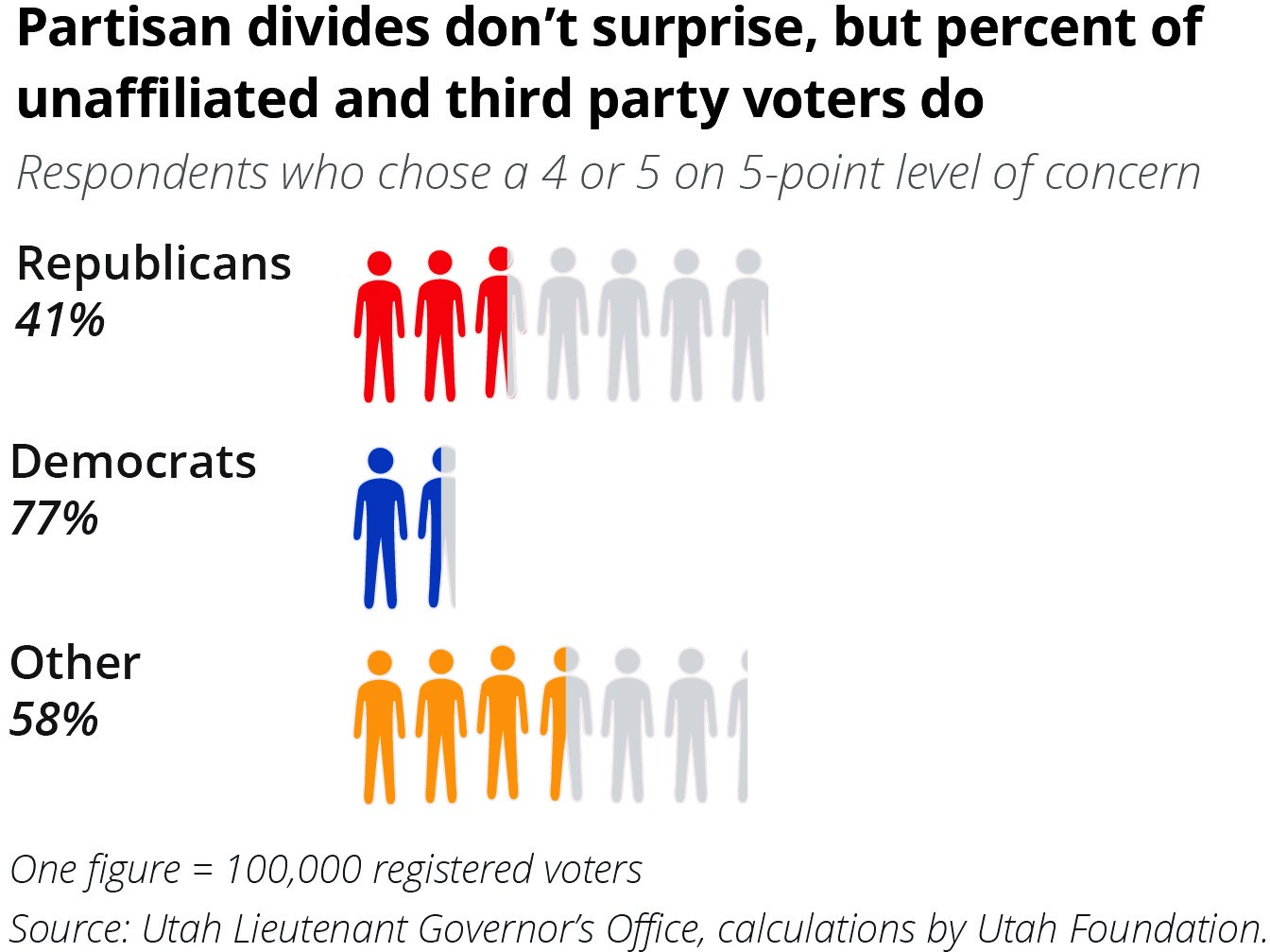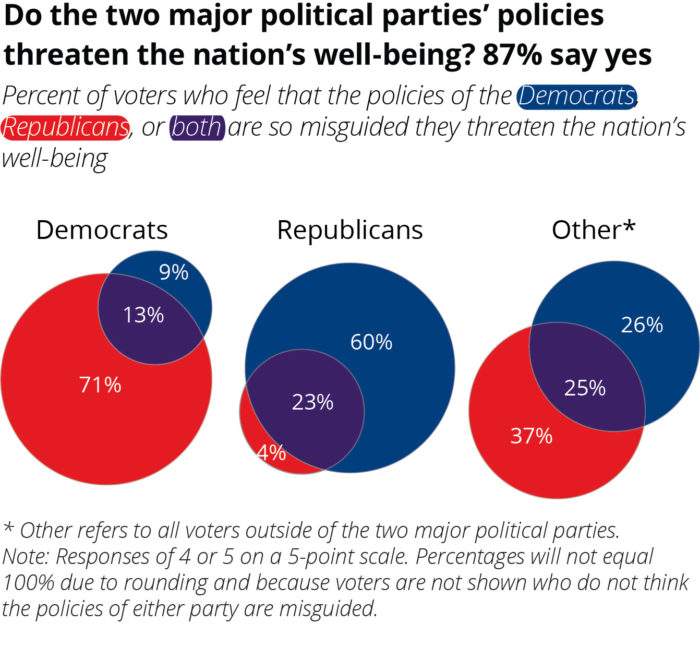Partisan politics appeared as a Utah Priorities Project topic for the first time in 2012. That year, over 50% of Democratic and Independent voters identified partisan politics as a concern. This year, partisan politics maintained the eighth position on the priority list.
Like 2012, 2016 is a big year for elections, both locally and nationally. The timing of the Utah Priorities Project survey could have impacted responses. The survey was administered prior to the party caucuses in the state and when presidential candidates were still undecided. These two factors created a constant stream of political news which potentially put this issue in the forefront of the minds of respondents.
UTAH POLITICS

At the state level, Utah has a strong political party divide in both the voting base and in local elected officials. By the end of June 2016, there were 160,277 registered Democrats, 699,005 registered Republicans, 586,851 unaffiliated voters, and 28,073 registered voters of other political parties in Utah.1 The Utah Priorities Project shows that ideologically, unaffiliated Utah voters are more likely to be conservative than liberal.2 This conservative lean can also be seen in the numbers of Republican state office holders. For example, while 45% of Utah voters are Republicans, 83% of State Senate seats and 84% of State Representative seats are held by Republicans. There are no third party candidates who currently hold office at the state level.3
As mentioned in the Utah Priorities Project delegate survey, Utah has a unique procedure for choosing candidates through the caucus-convention system. The decisions of delegates determine which candidates voters see on the ballot. The delegate report focused on the differences and similarities between survey responses of the voters and delegates of the two major parties. This year’s survey showed that while overall more liberal than their national counterparts, the median Utah Democratic voter and delegate were aligned ideologically. Republican voters and delegates saw some separation, with the median Utah Republican voter being less conservative than the median delegate.4
CONCERN ABOUT PARTISAN POLITICS
Overall, when respondents were asked their level of concern about partisan politics, over half of Utah voters were highly concerned (a 4 or 5 on a 5-point scale) about partisan politics.5
In looking at the data further, responses varied by political party. People who identified as Democrats had the largest percentage of respondents showing the most concern, with 77% indicating they were highly concerned. Although this question was asked for national politics, the level of concern may not be surprising due to Democrats being the political minority in a state where the overwhelming majority of elected officials are Republican. Over half (58%) of voters who did not identify with one of the two major parties were highly concerned, as were 41% of Republicans.
In order to get a better understanding of what partisan politics might mean to people, the survey asked additional follow-up questions.6 These questions were informed by comments gathered during the preliminary phase of the Utah Priorities Project. In a preliminary poll, comments regarding partisan politics ranged from dissatisfaction with politicians and the legislative process, to the divisiveness of the current political environment.
PRINCIPLES VERSUS COMPROMISE

A question that touched on a basic element of partisan politics referred to whether a politician should take a stand versus compromising to achieve an outcome. Overall, 56% of Utah voters agree that politicians should stand for their principles rather than compromising. Again, there are variations across party and ideological lines, as well as between those who identified with a religion and those who did not.
Respondents were asked to identify their political leanings, with five options ranging from very liberal to very conservative. Those who identified as moderate, somewhat liberal, or very liberal were more likely to disagree with the statement about politicians standing up for their principles than those who identified as somewhat conservative or very conservative. Over three-quarters of very conservative respondents agreed with the statement, while only 30% of very liberal respondents felt the same.
There are similar differences in response to this questions by political party affiliation. Republicans and Democrats have disparate views – nearly two-thirds of Republicans agreed with this statement while only 38% of Democrats felt similarly. One interesting difference can be seen between Utah’s two largest groups – unaffiliateds and Republicans. While a clear majority of Republicans agreed that politicians should stand up for their principles, only half of unaffiliated voters agree that politicians should stand up for their principles rather than compromise.
MISGUIDED PARTY POLICIES

Two questions addressed the two major political parties. These questions asked respondents whether they felt that the policies of the Democratic or Republican parties were “so misguided that they threatened the nation’s well-being.” The questions address partisan politics at a national scale rather than staying within Utah. Unsurprisingly, there was a strong connection between responses and people’s political ideologies and party affiliation.
Large majorities of Democrats (85%) and Republicans (84%) felt that the other party’s policies were so misguided that they threaten the nation’s well-being. One surprise finding emerged from how voters view the policies of their own parties. Approximately 27% of Republicans felt that Republican policies were so misguided they were a problem, while 22% of Democrats felt the same way about Democratic policies.
Those who did not identify with the two major parties seemed to have similar feelings about the policies of both parties, with 51% feeling negatively about Democratic policies and 62% feeling the same about Republican policies. Across all voters, 22% indicated that they felt the policies of both parties were so misguided they were threatening the nation’s well-being.
This research brief was written by Utah Foundation Research Analyst Mallory Bateman.
- ^ Utah Lieutenant Governor, Elections, “Voters by Party and Status,” https://elections.utah.gov/party-and-status, Accessed June 27, 2016.
- ^ Utah Priorities Project: Voter Survey.
- ^ Utah Foundation analysis of data available at Utah State Legislature, https://le.utah.gov.
- ^ Utah Priorities Project: Delegate Survey.
- ^ Utah Foundation’s 2016 Voter Survey. For more information see “2016 Utah Priorities Project: Survey of Voters’ Issues and Concerns (Part I)” Appendix A for methodological details.
- ^ Ibid.

